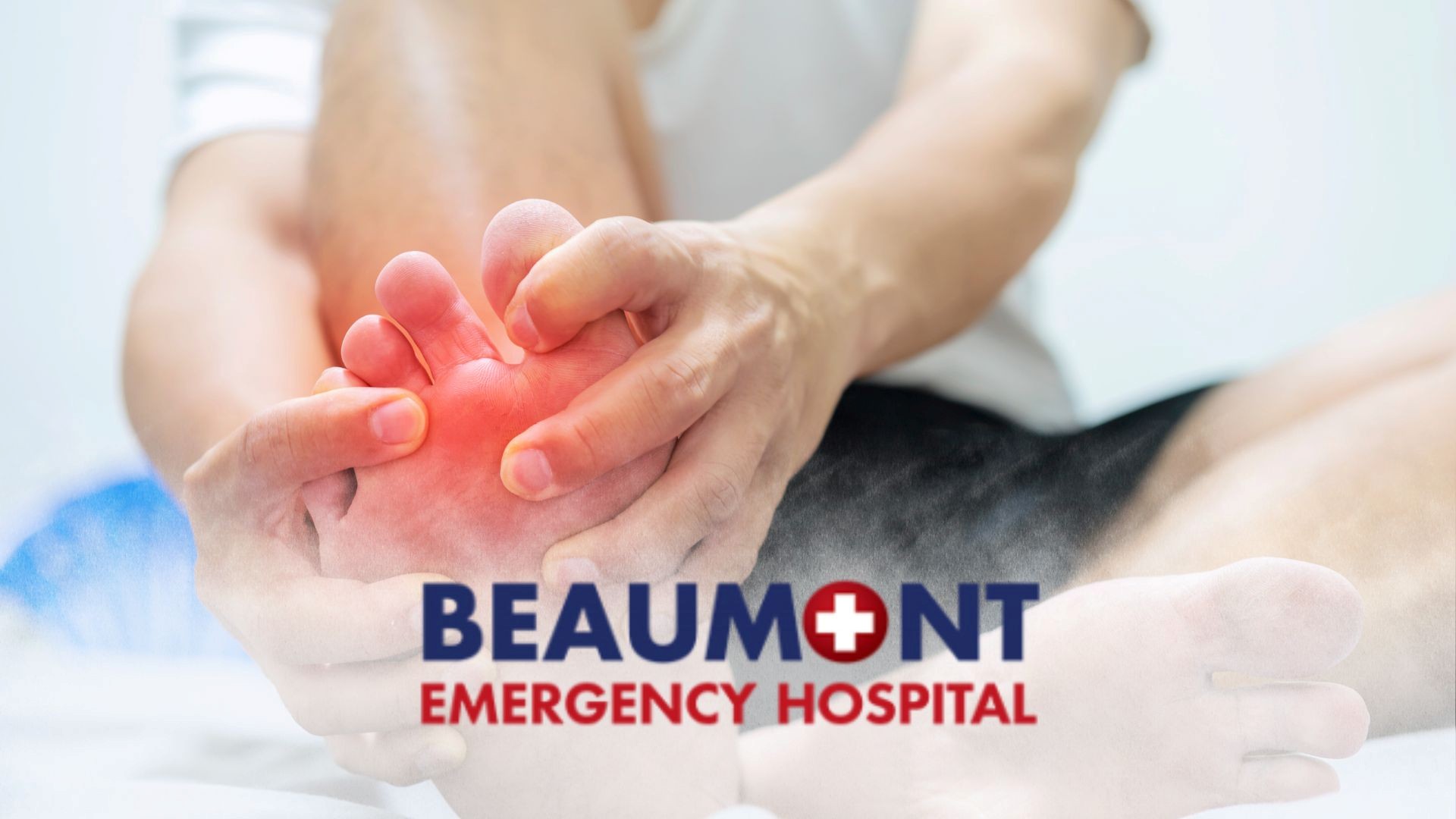
Gout is a painful form of inflammatory arthritis that occurs when uric acid builds up in the blood and crystallizes in the joints, leading to sudden and severe pain. While gout is common, many people don’t realize when their symptoms require emergency medical attention. If left untreated, gout can lead to long-term joint damage and an increased risk of complications.
At Beaumont Emergency Hospital, our Board-Certified Emergency Physicians provide fast, expert care to diagnose and relieve the intense pain associated with gout attacks. Here’s what you need to know about gout symptoms, when it becomes an emergency, and how we can help patients in Beaumont find relief.
Signs and Symptoms of Gout
Gout typically affects one joint at a time, most often the big toe. However, it can also occur in the ankles, knees, elbows, wrists, or fingers. A gout attack usually develops suddenly and reaches peak intensity within 24 hours.
Common signs and symptoms include:
- Sudden, severe joint pain – Often described as excruciating, this pain can wake people from sleep.
- Swelling and redness – The affected joint may appear swollen, red, and warm to the touch.
- Limited range of motion – Stiffness and tenderness can make it difficult to move the joint.
- Lingering discomfort – After the most intense pain subsides, the joint may continue to feel sore for days or even weeks.
Gout attacks may occur in cycles, with periods of remission between flare-ups. However, if left unmanaged, gout can become more frequent and severe over time.
When Gout Becomes a Medical Emergency
While many cases can be managed with medication and lifestyle changes, there are times when immediate medical attention is necessary. Seek emergency care at Beaumont Emergency Hospital if you experience:
- Extreme and unbearable pain – If the pain is intolerable and does not improve with home treatments, it may indicate a severe flare-up requiring urgent care.
- Signs of infection – If the joint is excessively red, swollen, or warm, and you have a fever, this could signal a joint infection (septic arthritis), which is a medical emergency.
- Multiple joints affected – If gout spreads to multiple joints at once, it could indicate a more severe case requiring immediate intervention.
- Inability to walk or use the affected limb – If your mobility is significantly impaired, an ER visit is warranted.
Ignoring these warning signs can lead to complications like permanent joint damage, kidney stones, or chronic inflammation.
How Beaumont Emergency Hospital Diagnoses and Treats Gout
At Beaumont Emergency Hospital, we provide rapid and accurate testing to diagnose gout and relieve pain. Unlike a traditional hospital ER, we offer shorter wait times and personalized care from Board-Certified Emergency Physicians who specialize in emergency conditions.
To confirm a gout diagnosis, we may perform:
- Joint Fluid Analysis – A sample of fluid is taken from the affected joint to check for uric acid crystals.
- Blood Tests – We measure uric acid levels to assess if gout is the likely cause of symptoms.
- Imaging Tests – X-rays or ultrasound may be used to check for joint damage or crystal deposits.
Once diagnosed, our emergency physicians will provide immediate relief with:
- Pain Management – Strong anti-inflammatory medications, such as NSAIDs, corticosteroids, or colchicine, can rapidly reduce swelling and discomfort.
- IV Fluids – Hydration helps flush excess uric acid from the body, preventing future attacks.
- Joint Aspiration (If Needed) – In some cases, fluid is drained from the joint to relieve pressure and pain.
Our goal is to quickly ease your pain and get you back to your daily activities as soon as possible.
Living with Gout: Preventing Future Attacks
After an emergency gout attack is treated, it’s essential to take steps to reduce future flare-ups. Our physicians will offer guidance on long-term management, which may include:
- Diet Changes – Reducing red meat, shellfish, and alcohol intake can help lower uric acid levels.
- Regular Exercise – Maintaining a healthy weight and staying active can prevent joint stress.
- Medication Management – Prescription medications may be recommended to lower uric acid levels over time.
- Staying Hydrated – Drinking plenty of water helps flush excess uric acid from the body.
If you experience recurring gout attacks, it’s important to follow up with a local specialist in Beaumont to manage your condition.
Get Fast Relief for Gout at Beaumont Emergency Hospital
Gout pain can be debilitating, but you don’t have to suffer through it alone. If you’re in severe pain, experiencing complications, or worried about your symptoms, visit Beaumont Emergency Hospital for expert, 24/7 emergency care. Our Board-Certified Emergency Physicians will test, diagnose, and treat your symptoms quickly and effectively, so you can get back to living pain-free.
Don’t let a gout flare-up control your life—get the fast relief you need today!
